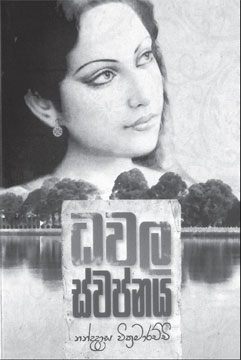Coffee romance
Dhawala Swapnaya
Author: Nandadasa Wickramarachchi
by Kalakeerthi Edwin Ariyadasa
“By 1825, the Ceylonese (as the Sri Lankans were then known), had a
knowledge of coffee. They started planting coffee, as a garden crop.
George Bird became the first to start planting coffee on a commercial
scale. Governor Edward Barnes also started a plantation. The term
‘Coffee Rush” was coined to describe this situation in 1840.”
 The mega novel is a cult that is spreading at a fast clip, in today's
Sinhala literary scenario. Many works of fiction, that appear currently,
belong in the category of jumbo novels. What has brought on this trend
is an issue that needs to be probed in depth. The mega novel is a cult that is spreading at a fast clip, in today's
Sinhala literary scenario. Many works of fiction, that appear currently,
belong in the category of jumbo novels. What has brought on this trend
is an issue that needs to be probed in depth.
While we are on it, let's take up one of the latest in this class.
The work is titled Dhawala Swapnaya (The white dream) and is authored by
Nandadasa Wickramarachchi – a quiet, admirably painstaking scholar. The
defining detail, that forms the core and the soul of this diligent
exercise in fiction, should earn this work the sobriquet “Research
documentary.”
The novel is set in a period of Sri Lankan history, that has received
but scant scrutiny from fiction – experts.
Writer Nandadasa Wickremarachchi has opted to place his characters in
the backdrop of the “Coffee rush” era – the heyday of Sri Lanka's coffee
berry.
Any run-of-the-mill period novel, usually focuses, as a rule, on a
phase of history the writer is specifically concerned with.
Fictional trek
But, in this work, scholar – novelist Nandadasa Wickramarachchi, sets
out on a globe -girdling fictional trek. In stark reality, his canvas
for this tale of fiction, is a good part of the 19th century world.
The theme he has selected in the novel makes it mandatory, that the
narration should encompass, several cultures and an extensive segment of
the global geography.
The central personality of the novel is Roger Smith. As the novel
starts, he takes an “omnibus’ trip, from the suburbs to the elitist
heart of cosmopolitan London. There, in a formidable and daunting
mansion, he is ushered into the presence of Sir Edward Spencer, British
aristocrat, living in elegant retirement. Raised in England. Roger
Smith, served professional apprenticeship in Jamaica, in the West
Indies, across the Atlantic. Roger Smith meets Sir Edward to obtain
letters of introduction, to some prominent personalities in Sri Lanka
(then Ceylon) where Roger Smith plans to establish his coffee
cultivation.
I cannot help but admire, writer Nandadasa Wickramarachchi's keen
awareness of the 19th century British social etiquette.
This dedication to the authentic portrayal of a phase of history that
has passed, is eloquent witness to his creative sincerity.
The next segment of his novel is occupied by his narration of the sea
– voyage from the UK to the Port of Galle, in Sri Lanka – via Cape Town
and Bombay. His “passage to Sri Lanka (then Ceylon)” stands out as an
absorbing profile of an ocean voyage in the 19th century. When he
disembarks at the port of Galle, the fluttering Union Jack, profusely
displayed at strategic points in the Fort of Galle, gave him a patriotic
thrill. His detailed account of the Fort of Galle, and the streets and
residences within it, could occur only in the minds of an articulate
archaeologist.
Exploits
When the writer turns to the city of Colombo of that day, he exploits
the opportunity to display his adept knowledge of the city of Colombo
and its suburbs as they existed at the time period he focuses on.
The central urge of the novel, is to set down, in the style of a
mini-saga, the ethos and the ambience of the British coffee life in Sri
Lanka, during the dramatic era of the coffee-rush.
The author notes, with avid reality the simmering resentment and
hatred that spluttered just beneath the surface of planter-peasant
relations, in the regions, where the British planters had established
their coffee domain. The exclusive, coterie mentality of the planting
community, holding together, against all odds, is a graphic instance of
the unifying effect of external threats.The protagonist Roger Smith,
progresses throughout the fiction, propelled by two urges.
The first and the most obvious compulsion is the need to make his
coffee plantation a super-success – dealing with such opponents as
Dumbaraya, resorting to any strategies he thought fit. At times these
effects bordered upon the utterly unscrupulous.
His next and the excessively obsessive preoccupation was his
unexpressed passion for Miriyagalle Kumarihamy. Roger Smith's very first
meeting with her, shattered his inner peace, making him take along an
indelible impact, throughout his lifetime. Writer Nandadasa
Wickramarachchi's coffee saga, does not reach the historical end of the
coffee plantation in Sri Lanka – the coffee blight.
The writer concludes the narration with the execution of the Rebel
Puran Appu – a national hero, and the destruction of Roger Smith's
“White House”, which he always thought was unassailable. Roger Smith's
White Dream, was never actualised. But, writer Nandadasa Wickramarachchi
has endowed upon the lovers of Sri Lanka, a historical saga, they could
ponder on for quite a long while.
|



